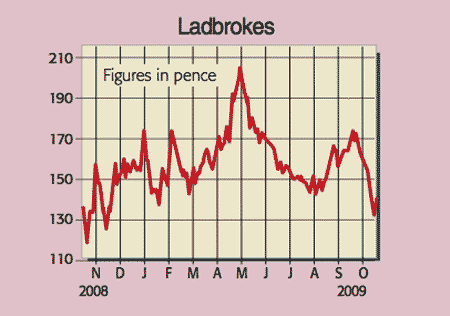Get the latest financial news, insights and expert analysis from our award-winning MoneyWeek team, to help you understand what really matters when it comes to your finances.
You are now subscribed
Your newsletter sign-up was successful
Want to add more newsletters?

Twice daily
MoneyWeek
Get the latest financial news, insights and expert analysis from our award-winning MoneyWeek team, to help you understand what really matters when it comes to your finances.

Four times a week
Look After My Bills
Sign up to our free money-saving newsletter, filled with the latest news and expert advice to help you find the best tips and deals for managing your bills. Start saving today!
This time last year, Ladbrokes' shares were trading at 380p. But a series of losing bets, a lack of major sporting events, and poor winter weather have caused the stock to tumble by 60%.
The latest bizarre set of sporting upsets came when just 6% of the first 66 Premier League soccer matches played this season ended in a draw, compared with a five-year average of 25% which in turn led to a profit warning. This bad luck, combined with weaker punter activity, has forced the board into a one-for-two rights issue at 95p to raise £275m and reduce its £995m debt load.
So what now for Britain's largest bookie? Momentum traders would say cut your losses, which is what's been happening. But I reckon there's still good value for patient investors.
MoneyWeek
Subscribe to MoneyWeek today and get your first six magazine issues absolutely FREE

Sign up to Money Morning
Don't miss the latest investment and personal finances news, market analysis, plus money-saving tips with our free twice-daily newsletter
Don't miss the latest investment and personal finances news, market analysis, plus money-saving tips with our free twice-daily newsletter
Firstly, the industry has time and again shown its ability to provide cheap entertainment in periods of economic turmoil. And with such a strong brand, serviced from 2,100 shops, telephone betting centres and a successful eGaming unit, then there will be better times ahead once Ladbroke's unlucky streak ends.
Ladbrokes (LSE: LAD)

Turning the clock forward a couple of years, I believe the group can, with continued tight cost control, deliver sustainable Ebita of £300m a year on turnover of £1bn by 2011. Using a ten-times multiple, and after deducting its pro forma debt of £720m and discounting back at 12%, you get an intrinsic value of around 200p a share. And while the dividend has been suspended, the bookie is highly cash generative, so a 5% dividend yield looks readily achievable.
What are the wild cards? Borrowing levels must be monitored, albeit with a comfortable post-rights loan to Ebitda ratio of 1.9 (including high rollers, or gamblers who typically wager five-figure sums), and further fundraising looks unlikely. Another concern is if punters' appetites continue to wane due to higher unemployment and stagnant wage growth.
Finally, the industry is tightly regulated across Europe, and there's always a chance that governments will increase taxes, or ban online games as America did in October 2006. But the run of adverse sporting results won't last forever. And with the added fillip from the football World Cup in 2010, Ladbrokes looks a tasty wager for the more adventurous investor. Daniel Stewart has a 240p price target on the stock.
Recommendation: speculative BUY at 140p
Paul Hill also writes a weekly share-tipping newsletter, Precision Guided Investments
Get the latest financial news, insights and expert analysis from our award-winning MoneyWeek team, to help you understand what really matters when it comes to your finances.
Paul gained a degree in electrical engineering and went on to qualify as a chartered management accountant. He has extensive corporate finance and investment experience and is a member of the Securities Institute.
Over the past 16 years Paul has held top-level financial management and M&A roles for blue-chip companies such as O2, GKN and Unilever. He is now director of his own capital investment and consultancy firm, PMH Capital Limited.
Paul is an expert at analysing companies in new, fast-growing markets, and is an extremely shrewd stock-picker.
-
 Can mining stocks deliver golden gains?
Can mining stocks deliver golden gains?With gold and silver prices having outperformed the stock markets last year, mining stocks can be an effective, if volatile, means of gaining exposure
-
 8 ways the ‘sandwich generation’ can protect wealth
8 ways the ‘sandwich generation’ can protect wealthPeople squeezed between caring for ageing parents and adult children or younger grandchildren – known as the ‘sandwich generation’ – are at risk of neglecting their own financial planning. Here’s how to protect yourself and your loved ones’ wealth.